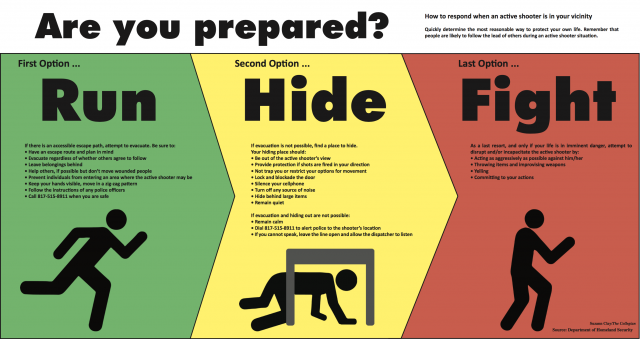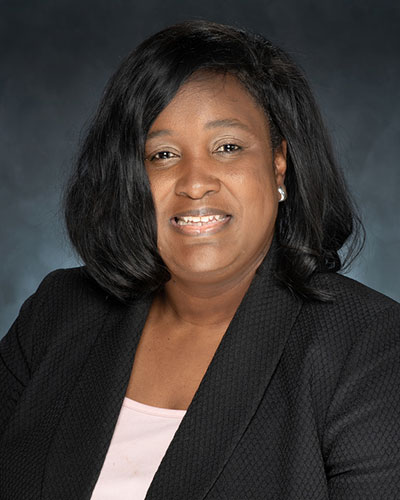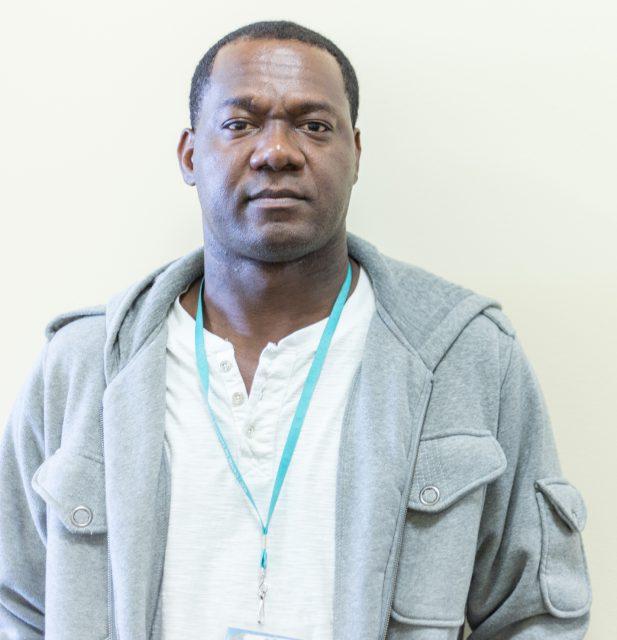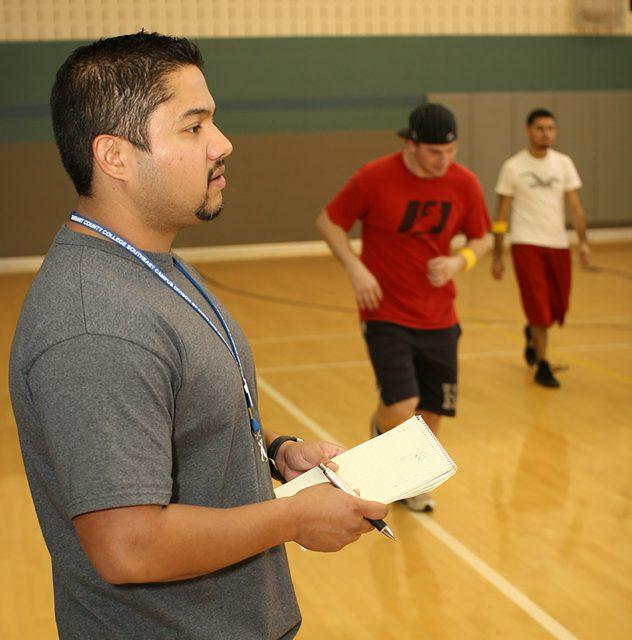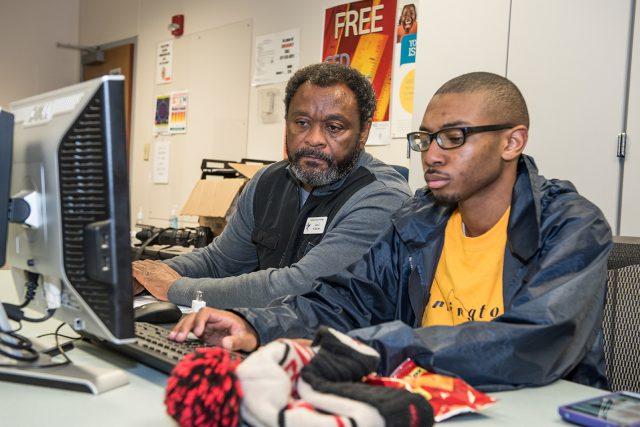By Kathryn Kelman/editor-in-chief
In the weeks following a high-profile school shooting in Florida, many TCC students say they feel safe on their respective campuses but not necessarily prepared to face an emergency situation.
As the school shooting has dominated headlines, many campuses across the country have evaluated their own preparedness.
At TCC, some students say they have never participated in an emergency drill or training while at TCC.
Kai Marion has been a student on NW and TR campuses for two years but has never participated in an emergency drill or training.
“No, I don’t feel prepared,” she said. “I don’t know what to do.”
She said doing drills, especially after the Feb. 14 school shooting in Parkland, Florida, should be important for the college. At the same time, she said she doesn’t feel unsafe.
“I see lots of cops around, but it would be nice to know what to do in an emergency,” she said.
TCC conducts drills on every campus, every semester, according to emergency management director Kirk Driver.
In 2016, the college conducted 16 emergency drills across all five campuses and other properties, according to TCC police’s annual crime report.
“Those drills are conducted by TCC police and are a way to test some of our notification systems,” Driver said.
Campus police determine what drills to do, when and what campus building to evacuate because they can’t conduct a drill across the entire campus at one time, he said.
SE student Inez De La Cruz has also never participated in an emergency drill or training session. She is worried about not knowing TCC’s protocols, she said.
“If something bad were to happen, it would be chaotic if you didn’t know where to go or what to do,” she said.
Ricardo Guijosa, who’s been a student on TR and TR East for three years, has also never participated in an emergency drill or training, he said. For Guijosa, the only reason he feels prepared to face an emergency while on campus is because of the training he received in the Navy, but he would like to see more drills happen at TCC, he said.
“I think most people should know what to do in case of any form of emergency,” he said. “Drills help with that.”
SE student Jonathan Torres has attended the campus part time since 2014 and has also never participated in any drills. But he isn’t too worried about it, he said.
“We’ve been practicing that stuff since elementary school,” he said. “Depending on the emergency, I think I’d be OK.”
Both Torres and Guijosa said they feel safe on their campuses because of the high police presence and because they’ve never encountered anything bad or serious while there.
Assistant police chief Chanissa Dietrich said drills are up to each campus, and officials rotate which drills they choose to do each term.
“They won’t do a fire drill and then another fire drill or a lockdown drill and the next semester another lockdown drill,” she said. “They try and change it up so that they’re not doing the same thing, and we keep the different protocols on everybody’s mind.”
The information regarding the protocols, and informational videos like one called “Shots Fired,” which provides active shooter training, can be found at www.tccd.edu/about/emergency-information/know-what-to-do/active-shooter/, and a districtwide email is sent out each semester, she said.
“Now whether anyone slows down and takes a look at it, I couldn’t say, but we get it out to everybody and we direct everybody back to the website,” she said. “Please come to the website. This is good information. We keep it updated. Please come and look at it.”
At a minimum, Dietrich said she would prefer people watch the “Shots Fired” video and read the information.
“The active shooter information is good, but there’s also other incidents that people need to be prepared for, and on that emergency management site, there’s a lot of good information for different scenarios,” she said.
The website has the most accurate information, Dietrich said.
“If there was a new best practice for how we want people to react, we would go in and update it,” she said.
According to the college’s website, the protocols were last updated in August 2016, but all of the protocols and drills are up to the national standard, Driver said.
“We constantly continue to assess to ensure the drills are effective and then that our protocols remain with what the national standard is,” he said. “Currently, the national standard is ‘Run, Hide and Fight,’ which is something you can take outside of an institution of learning.”
The important thing for students, faculty and staff to do is update their myTCC alert profiles, he said. All students, faculty and staff are automatically enrolled to receive myTCC alerts through email, but legally, the college can’t enroll anyone to receive the alerts via text.
“We would rather have students update their profile and opt into receive the text messages because texts are serviced much quicker through your cellphone provider, and most people are more apt to read their texts than an email or listen to a phone message,” he said.
Guijosa hasn’t set up his myTCC alerts yet but does remember getting the emails to do so.
“It usually catches me at the wrong time,” he said. “It’s more on the purpose and the person and I should really sit down and do it.”
To update profiles, students can go to TCC’s home page and under the emergency and safety section find the link that says “myTCC alerts” and it will walk them through how to do so, Driver said.
Everyone receives a welcome email that has the password to access their account.
“If you’ve lost that, we can reset the password and normally what we do is we just stay on the line and we walk the student or faculty member through the process to be sure that they don’t have any other issues,” he said.
MyTCC alerts are only one of the college’s systems used to notify people. Different systems are used depending on what’s going on and where, Driver said. One is Alertus, which has an app that is free to download, he said.
“This is useful for situations like for when people are in between their vehicles and a building and the app could alert them to not go into a particular building,” he said. “We would love for our staff, faculty and students to take advantage of that.”
None of the students interviewed knew about the app, but NW student Tasha Morrison said she likes the idea of it.
“I work full time, go to school full time and I’m a single mom so I don’t always check my email, so that would be good to have,” she said.

Alertus Login Information
1. Download the Alertus app
2. Sign up with your TCC email
3. Enter in the organizational code TCCD
4. Enter the PIN code 8911
When searching for the app in the Apple App Store or Google Play the results offer two options. Students, faculty and staff need to download the yellow “recipient” app.


























